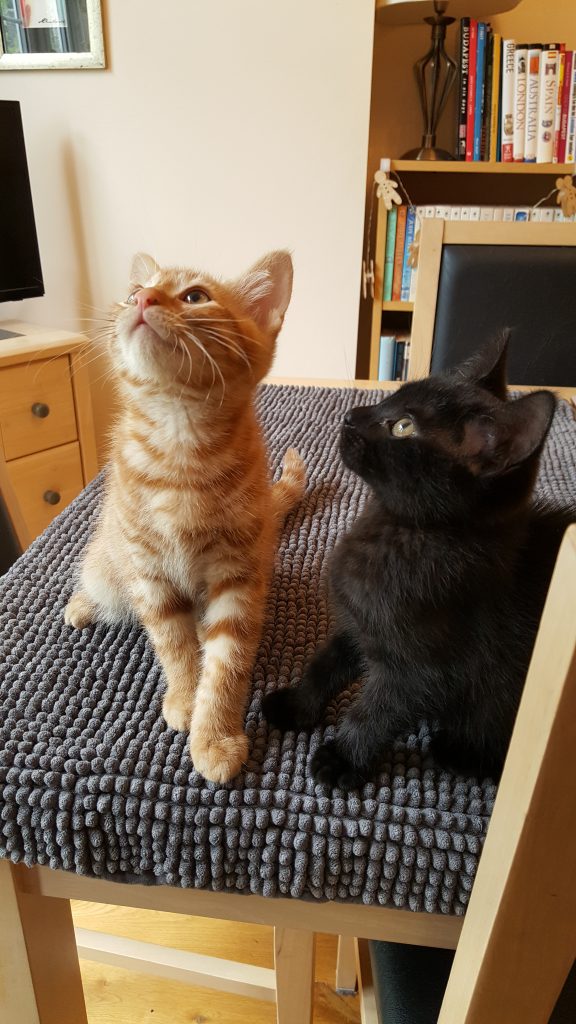
Cat age: 0-6 months
Human equivalent: 0-6 years
They’re young and energetic, willing to try new things and learning how the world works. Despite kitten-proofing your house, they always find new ways of getting into trouble. As a kitten owner, there’s a lot for you to ‘do’ but it’s not just about vet visits, there is a lot you can do to prepare your kitten for life in this world.
Recommended Veterinary Care
| What needs to be done? | How often?* |
| Health check/physical exam | Every 3-4 weeks until 16 weeks then around the time of neutering |
| Weight check | Every 3-4 weeks until 16 weeks then around the time of neutering |
| Vaccination | Every 3-4 weeks until 16 weeks then 1 year later |
| Worming | Every 3-4 weeks until 16 weeks then every 3-6 months as required by lifestyle |
| Flea treatment | Monthly, if you choose to treat, otherwise flea comb monthly |
| Nail trim | If you are going to do this regularly, get them used to it now |
| Blood pressure check | Not required at this age |
| Urine test | Not required at this age |
| Blood test | Optional including FIV/FeLV, possibly at time of neutering |
| Neutering | Usually around 4-6 months of age |
| Microchip | Either at the time of neutering or before |
| Pet Insurance | If you would like to insure your cat, do so on the day you bring them home |
*Please note, recommendations may differ between vets and there isn’t necessarily a right or wrong answer, these are just our suggestions based on our desire to keep our cats safe but avoid over-treatment at the same time!
How You Can Help At Home
Get them used to being handled
- Practice brushing their teeth, clipping their nails and brushing their coats while they are young to avoid stress later in life.
- If you will regularly be taking your cat to a veterinary clinic, cattery or groomer, do your best to acclimate them to their basket and riding in the car too.

Get them used to wearing a collar
- If your cat will be wearing a collar (which has both advantages and disadvantages), you should introduce it at a young age so they get used to it.
- Always choose a comfortable, quick-release collar of the correct size (you should be able to get 2 fingers under the collar easily) and don’t forget to loosen it as your kitten grows.
Encourage them to play nicely
- Biting and scratching should not be tolerated, even during play, and if they do start to bite or scratch, simply stand up and walk away or distract them with a more suitable toy.
- Never use your hands or feet as objects for them to pounce on. Instead provide balls, toy mice and feather wands which allow your kitten to express their natural play/hunting instincts in an acceptable and sustainable manner (good for adult cats too!).

Socialise them
- Invite your friends and their (well-behaved) children over so your kitten can be exposed to potentially stressful situations in a calm and controlled manner from an early age.
- Not all kittens like to be cuddled though, as much as we may want them to, so make sure you give them a bit of space as well.
Let them rest
- Growing is hard work so in addition to lots of play time and socialisation, don’t forget to allow them some down time.
- Create some hiding places where they can escape from all the activity if they feel the need to do so. Providing places up high, or making the most of ‘vertical space’ allows your kitten to watch the world go by at a safe and peaceful distance.
Keep them safe
- Be very mindful of household hazards and do your best to keep these to a minimum. That means no lilies in the house, full stop! Other common hazards include household cleaners, potpourri, essential oil diffusers, many human foods and all medications.
- Never use topical products on your cat unless specifically recommended by your vet – kittens are particularly susceptible to toxicities from inappropriate treatments. Medications used on dogs are often not safe for cats, and topical products such as TCP, Germolene, Savlon and tea tree oil can be extremely toxic for cats.
Offer a variety of foods
- Kittens may start to show dietary preferences from a young age but just like a small child, keep offering a variety of foods (including different textures – fresh meat, biscuits, pates, chunks in gravy etc).
- Feeding just one type of food not only risks excesses/deficiencies but can also cause problems later on in life. For example, cats that grow up eating nothing but dry food run into serious problems if they require long-term medical treatment when they get older because it is nearly impossible to hide medications in dry food.
Feed a high quality diet

- Kittens should be eating a complete and balanced food suitable for growth and a fresh, small portion should be offered many times a day so they have it when their small bellies need it.
- Remember that cats are strict carnivores – they are built to eat other animals or in other words, meat. Although most cats can tolerate grains and starchy foods to some extent, some cannot. Unless your vet has specifically recommended a particular diet for medical reasons, you are generally safe to feed your cat the highest meat content food you can afford and avoid foods with a lot of grains or fillers (NOTE – ‘grain-free’ does not necessarily mean high in meat so check the ingredients list carefully).
- In general, wet foods are closer to the natural diet of a cat than dry foods and also help prevent dehydration so they are usually a better choice for the majority of your cat’s diet.
- Make sure most of the food you feed your cat says it is ‘complete and balanced’, as feeding too many ‘complementary’ foods can result in dietary imbalances.
- Meat is the most expensive component of any pet food so unfortunately the best foods for your cat are often the most expensive. Can’t afford top quality cat food 7 days a week? Mix and match, or supplement their diet from time to time with a high quality protein sources such as plain cooked chicken or fish.
- Learn which foods your cat prefers and avoid those that regularly cause stomach upset as what works for one cat may not work for another.
- Always make sure your cat has access to fresh water, even if they don’t seem to want to drink it. Cats don’t usually like to eat near where they drink, so separate their food and water dishes.
Know your breed
- If your cat is a particular breed, find out what conditions your cat may be genetically predisposed to and learn what you can do to catch these conditions early should they affect your cat.
Good To Know
Kittens tend to play hard then sleep deeply so if your kitten tires easily or doesn’t want to play, bring this to the attention of your vet. Actively play with your kitten as this will not only provide exercise but also teach them skills such as balance, patience and perseverance.

Kittens are naturally curious so if your kitten is hiding away all the time, speak with your vet. Equally, be very mindful of household hazards and do your best to keep these to a minimum. That means no lilies in the house, full stop! Other common hazards include household cleaners, potpourri, essential oil diffusers, many human foods and all medications.
Most kittens will also naturally use a litter tray, provided it is of a suitable size and level of cleanliness, so if there is a problem with urination or defecation, speak with your vet to get it sorted ASAP. Make sure you keep their tray clean, get a larger one as they grow and put it in a quiet location in the house so they are not discouraged from using it.
Kittens are usually pretty good at keeping themselves clean and do not need regular bathing. If they do manage to get themselves in a mess, spot clean with wet cotton wool rather than a full on bath. If you think they may have gotten any sort of chemical on their coat, ring your vet straight away for advice.
Kittens grow quickly and by the age of 6 months the average cat weighs approximately 2.5kg or more, although obviously every cat is an individual and some will be smaller than others. If you are worried about your kitten’s growth, please speak with your vet.
Some cats reach sexual maturity as early as 4 months of age so unless you plan to breed them (in which case please do the necessary research as allowing kittens of this age to become pregnant is not appropriate) make arrangements to have them neutered during this age. If your female kitten starts to show signs of being in season, be sure to separate her from any intact male cats, including siblings of the same age just to be safe!

It is normal and essential for cats to scratch things with their claws in order to keep their nails at a healthy length and as a sign of territory marking, much as they would learn to do in the wild. If you don’t want that ‘thing’ to be your sofa, provide a wide variety of scratching posts of different materials and sizes for your kitten to choose from. Don’t forget to upgrade them as your kitten grows!
Kittens lose their baby teeth around 4-6 months of age. This may result in teething pains, temporary redness of the gums or even the odd tooth left around the house!
They may start to show an interest in the outside world but just like you wouldn’t trust a 3 year old child playing near the road, please keep your kitten indoors until they are at least 6 months old (and neutered and microchipped).
If you would like even more information about how to care for kittens, or what to think about when getting a kitten, iCatCare has created a fabulous guide for new kitten owners which you can find here!
This guide is based on the AAFP-AAHA Feline Life Stage Guidelines publication, as well as recommendations made by the ISFM CatCareforLife and iCatCare websites – please visit these highly informative websites for additional information.

